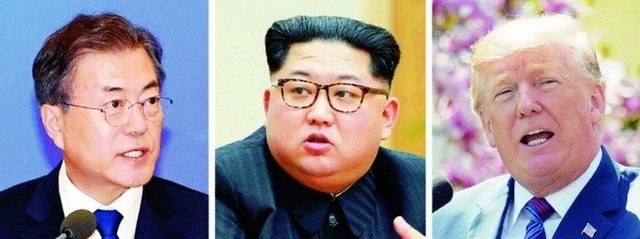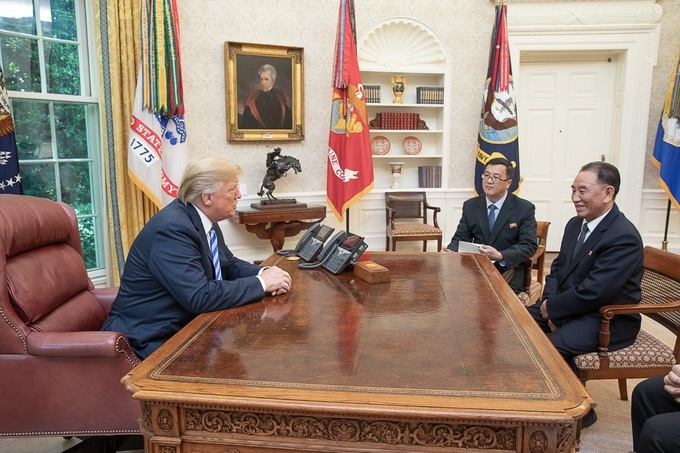 |
|
From the left are pictured South Korean President Moon Jae-in, North Korean leader Kim Jong-un and US President Donald Trump.
|
Declaration would end hostile relationships and expedite denuclearization
After US President Donald Trump directly mentioned the possibility of officially ending the Korean War before his summit with North Korean leader Kim Jong-un in Singapore on June 12, attention is growing about what this declaration might mean. For the leaders of South Korea, North Korea and the US to come together to declare that there will be no war on the Korean Peninsula would signify the end of the world’s last remaining conflict of the Cold War and the first step toward a permanent peace regime. That is also why declaring the end of the war has been mentioned several times since South Korean President Moon Jae-in first broached the topic during his Berlin Declaration in July 2017: the idea was made official in the Panmunjeom Declaration on Apr. 27, a suggestion was made during the press conference following Moon and Kim’s second inter-Korean summit on May 26 that the war could be declared over during a trilateral summit between Moon, Kim and Trump. Before it was decided that the Trump-Kim summit would be held in Singapore, the Blue House had let the US and North Korea know via various channels that it preferred for the summit to be held in Panmunjeom. The assumption was that if the Trump-Kim summit—which is supposed to deal with the denuclearization of the Korean Peninsula and a corresponding security guarantee for the Pyongyang regime—proves successful, Panmunjeom would make it easier for Moon, Trump and Kim to immediately hold a summit. The basic idea is that, if you have to skate across thin ice, it’s best to go fast. The Blue House appears to think that such a trilateral summit would be very symbolic and effective at stabilizing affairs on the Korean Peninsula, which are prone to being derailed by various factors. “A declaration of the end of the war or a peace treaty might not mean much if they don’t lead to concrete steps. Even so, the reason President Moon has continued to stress the three countries declaring the end of the war is because such a declaration could end hostile relations on the Korean Peninsula and become the first step to denuclearization and the establishment of a permanent peace,” a Blue House senior official told The Hankyoreh over the phone. While declaring the war over is not itself as important as the three countries’ carrying out that declaration, the official said, the declaration would be significant in concluding one stage in the long journey toward a peace regime on the Korean Peninsula. If the success of the Trump-Kim summit leads to the declaration of the end of the war during a summit among the three countries, it could serve as a safety valve that would prevent inter-Korean relations and North Korea-US relations from “backsliding,” this official said.
 |
|
US President Donald Trump speaks with Kim Yong-chol, North Korea’s vice chairman of the Workers’ Party of Korea and director of the WPK United Front Department, in the White House’s Oval Office on June 1.
|







